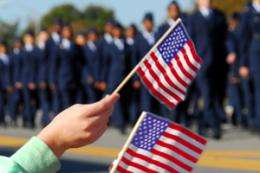Women veterans report poorer health despite access to health services, insurance

As more and more soldiers return from recent conflicts overseas, new research reveals that female veterans experience poorer health than other women.
In 2010, women made up 8 percent of the U.S. veteran population, according to the U.S. Department of Veterans Affairs (VA).The study, appearing in the American Journal of Preventive Medicine, is the first to demonstrate how female veterans’ health status differs from their civilian and active duty counterparts, even when controlling for access to health care.
“While we found that women veterans were more highly educated, had higher incomes and were more likely to have health insurance, they reported worse health compared to active duty, National Guard or Reserves and civilian women across a host of outcomes,” said lead author Keren Lehavot, Ph.D., of the VA Puget Sound Health Care System in Seattle.
The study used data from the 2010 Behavior Risk Factor Surveillance Survey, a national phone survey that included 274,399 civilian women, 4,221 veterans, 661 active duty military and 995 women in the National Guard or Reserves. Researchers asked each person about her access to health care and health status.
Women veterans were more apt to smoke, be overweight or obese and have heart disease compared to civilian and National Guard or Reserve women. Veterans also reported more instances of depression and anxiety.
Yet, it was not all bad news for women in the military. Women who were serving on active duty had better access to health care, better physical health and were less prone to engage in risky health behaviors.
The researchers did not determine potential reasons for these disparities, but Lehavot said previous studies suggest that women veterans’ increased exposure to violence as well as inadequate social support might be associated with poorer health.
“We need additional research to determine if these, and other factors, help explain the differences we found,” she said.
Lehavot added that there have been changes in the Veterans Health Administration in recent years to reach out to women veterans and facilitate their access to care.
So why aren’t women currently using the health services available to them within VA medical system?
Chloe Bird, Ph.D., a senior sociologist at the RAND Corporation and expert on women’s health issues, said many factors, including geography, could determine whether women utilize the VA.
“For example, not all veterans live within easy access to a VA medical center, and the VA is far better recognized for their men’s health care than for women’s health care,” she explained. “Many women veterans may associate the VA with images of a place that serves a population of older men.”
Bird agreed that specialized outreach and other targeted interventions could improve the health and well being of the women veteran population.
More information: Lehavot K, Hoerster KD, et al. (2012). Health indicators for military, veteran, and civilian women. American Journal of Preventive Medicine, In Press.















